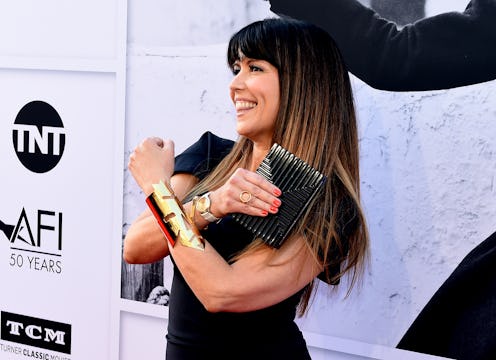Entertainment
With One Powerful Line, Patty Jenkins Shot Down James Cameron's Claims That 'Wonder Woman' Isn't Feminist

It's no secret that the summer of 2017 belonged to Wonder Woman and the female audiences who made it a hit. Sadly, though, Titanic director James Cameron has decided to criticize Wonder Woman and question the superhero's feminism, calling the movie "a step backwards" for women in an interview with The Guardian. His comments are certainly frustrating, but instead of letting the white, male filmmaker dictate feminism in Hollywood, Wonder Woman director Patty Jenkins responded with a statement so powerful, it squashes Cameron's own comments completely. And this one line from Jenkins' response is an absolute must-read, as it makes it crystal clear that it's women who have the power to determine what makes a movie or person feminist, not one bitter dude.
Jenkins' rebuke of Cameron's dismissive thoughts can be boiled down to this one essential truth: that it is women who have the ability and the standing to declare Wonder Woman a feminist, not a male director with a history of less-than-stellar behavior and actions in regards to feminism. "And the massive female audience who made the film a hit it is [sic], can surely choose and judge their own icons of progress," Jenkins wrote.
With one sentence, the director puts the power to determine feminist icons back where it belongs — in the hands of women. Onscreen feminists are not dependent on Cameron's approval, nor should they be. It is the opinion of the women who watch them, admire them, and bring them up as heroes that matters. This is one thing men do not get to dictate.
Jenkins' assertion that women can "choose and judge their own icons of progress" further serves to illustrate how women, not men, are in the best position to create feminist icons onscreen. Just as women can decide for themselves who they choose to celebrate as a feminist, they can also create them. And, more than that, they can do so successfully. Wonder Woman recently became one of the most successful superhero movies ever, with $404 million in domestic gross. It's now the best-selling origin movie in the genre, not to mention the highest grossing film from a female director.
And yet, Cameron is seemingly still operating under the misguided belief that he is a better creator of feminist content than Jenkins. In his comments, the director brought up his own films, The Terminator and The Terminator 2, as shining examples of feminism, saying, "Sarah Connor was not a beauty icon. She was strong, she was troubled, she was a terrible mother, and she earned the respect of the audience through pure grit." Cameron, the man who insisted the female lead in his film Avatar had boobs, sees a movie directed by a woman as another example of "male Hollywood," but praises his own, 30-year-old work as the epitome of onscreen feminism.
In her complete remarks, Jenkins rejects Cameron's notion that because Wonder Woman is a historically "objectified icon," she can't be feminist. In fact, she illuminates Cameron to something he clearly doesn't understand: that women can be whatever they want to be. And that means, they can determine for themselves who they hold up as a feminist icon.
Despite all the backlash his comments have unleashed, it seems unlikely that Cameron will see the error of his ways. And that's where the real beauty of Jenkins' statement kicks in. She doesn't care. To the director, Cameron's opinion is just one, and his voice is easily drowned out by a chorus of women who have embraced this new Wonder Woman as a feminist icon for our times.
At the end of the day, Wonder Woman is a feminist icon whether Cameron chooses to acknowledge it or not. Because, as Jenkins states proudly, the opinion of one powerful man does not determine onscreen feminism. It is the women who create them, the women who shape them, the women who play them, and the women who watch them that have the power. And those women have spoken.